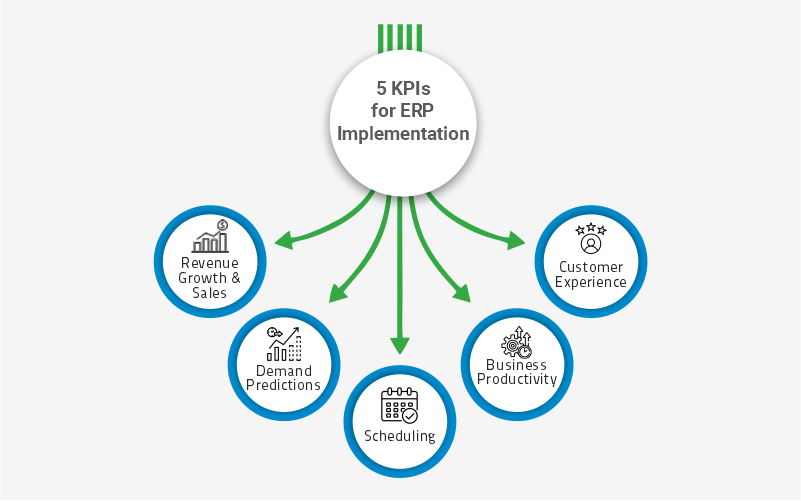Although implementing an enterprise resource planning (ERP) system is a difficult and time-consuming task, it also offers businesses a fantastic chance to reconsider their plans, objectives, and procedures. An effective ERP deployment can spur creativity and enhance a business’s various aspects. All decision-makers can collaborate effectively by centralizing the vast amounts of financial and business data coming from a company’s numerous departments, for instance.
A small number of key performance indicators (KPIs) can be used to show how well the new system is working.
5 KPIs for ERP Implementation

Revenue growth and sales
Revenue and sales metrics show how much money a company has made through the sale of its goods and services over a certain time frame, as well as how that changes over larger time frames, such as quarter over quarter and year over year. Average profit per item sold, operating margin, and average order value are common metrics in this area. Companies can identify their greatest revenue development possibilities and receive insight into areas where they can improve efficiency to reduce operating costs with the help of a correctly implemented ERP and the appropriate KPIs. When combined, these kinds of data can boost sales and profit margins.
Demand Predictions
Demand forecasting KPIs demonstrate how accurately a company can forecast future demand for its goods and services. For instance, to prevent stockouts or overordering, a chain of grocery stores has to estimate the things that its customers will buy at different times of the year. High forecast accuracy is provided by a well-configured ERP solution, which enables businesses to anticipate demand based on a combination of historical data and present-day indicators, such as an impending event, like Thanksgiving or a major storm, or a general economic trend, like a shortage in the supply chain.
Scheduling
As the name implies, scheduling KPIs helps companies track production speeds against their production schedules to ensure they don’t fall behind or miss crucial milestones. For a toy manufacturer, that milestone is to produce and deliver double the amount of its hottest games in time for the shopping rush. Likewise, a software vendor might have a strict production schedule to launch its latest product update. An ERP system simplifies scheduling by providing a clear picture of how manufacturing and production processes are tracking against deadlines and insights into possible disruptions so teams can adjust proactively.
Business Productivity
For good reason, productivity is a widely used indicator of corporate performance. A corporation and each of its departments and teams run the risk of falling short of its objectives if they don’t make the most of its working hours. Process inefficiencies, equipment breakdowns, supply chain problems, and decreased staff output are common barriers to business productivity; all of these may be tracked by an ERP system and evaluated holistically. A business can then examine every aspect affecting its productivity and decide how to increase it with greater knowledge. A warehouse manager might, for instance, notice that picking procedures for high-demand products have slowed down as a result of a staff shortfall and hire more workers to address the issue.
Customer Experience
The most crucial indicators for a business are probably its customer experience KPIs. Almost all changes a company makes to a procedure or function will affect and benefit customers, which in turn promotes sales, expansion, and longevity. These advances, which include quicker manufacturing turnaround times, more precise fulfilment, and more adaptable delivery options for a company’s goods and services, are best guided by ERP systems. As an illustration, a hotel chain operator can track guest feedback and reviews using its ERP to inform improvements to the guest experience.
ERP implementations need effort, commitment, and support from teams throughout the organisation. While it may be alluring to focus only on ROI and revenue, businesses can achieve demonstrable ERP installation benefits and position themselves for long-term success by improving the customer experience, internal operations, and workplace culture.
About Author
Olivia Jones
Technology Specialist
Olivia is a highly skilled and experienced Technology Specialist with 10+ years of hands-on expertise in the rapidly evolving field of technology. She has a proven track record of successfully implementing and managing a wide range of technological solutions, ensuring optimal performance and efficiency. Olivia possesses a deep understanding of industry trends and emerging technologies, enabling her to provide strategic guidance and drive innovation within organizations. With a strong focus on problem-solving, she consistently delivers tailored solutions that align with business objectives while maximizing productivity and cost-effectiveness.
About SoftTech Engineers
A leading IT company (www.softtech-engr.com) facilitating business and technology transformation across the AEC industry through innovative software products and solutions. Equipped with 25+ years of deep domain expertise and industry knowledge, SoftTech has helped more than 4500 clients & government organizations, with more than 25000 users in India and around the world to gain a competitive edge and lead from the front in the industry.

